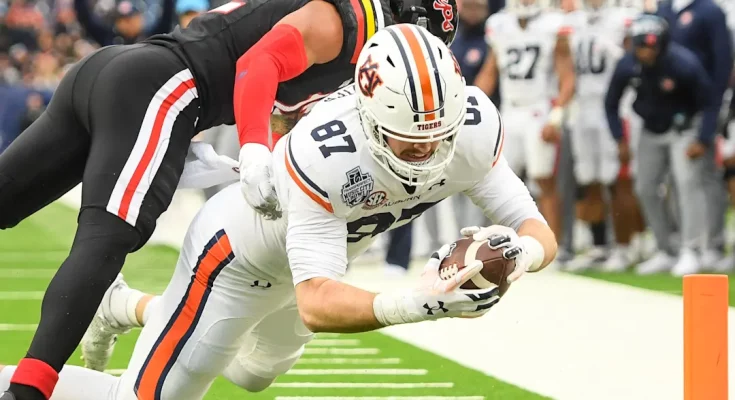For Auburn Tigers head football coach Hugh Freeze, the health and well-being of his players is a top priority, particularly when it comes to the tight end position.1 Freeze recently underscored this point, stating, “We need to keep them healthy.” This statement, seemingly simple on the surface, speaks volumes about the state of the tight end room at Auburn and the coaching staff’s approach to managing this crucial position.2
The tight end position in modern football is a hybrid role, demanding a unique blend of size, strength, and athleticism. Tight ends are expected to be effective blockers in the run game, and simultaneously, serve as reliable receiving options in the passing attack. This dual-threat nature places a significant physical toll on the players, making them susceptible to a variety of injuries. For a team like Auburn, which has seen its tight end room undergo a significant transformation, keeping the key players healthy is paramount to the unit’s success.
The departure of key veterans has left Auburn with a tight end room that is a mix of returning talent, transfers, and promising freshmen.3 The pressure to step up and perform is high, and the coaching staff is acutely aware that a key injury could derail their plans. This is where Freeze’s emphasis on health becomes particularly relevant. He is not just concerned with the players’ immediate ability to perform, but also with their longevity and long-term well-being.
The current tight end group is led by a few players who are expected to shoulder the bulk of the workload.4 Preston Howard, a transfer from Maryland, has been a notable addition. He brings a solid receiving background and is expected to be a key target for the quarterback. His ability to create mismatches and be a safety blanket in the passing game is a vital component of the offense. His health is, therefore, of the utmost importance. Another key veteran is Brandon Frazier, who has been with the program for several seasons.5 Frazier has shown flashes of potential but has also been hampered by injuries. His ability to stay on the field is a major factor in the tight end room’s success.6 Freeze’s statement is a direct acknowledgment of this history and a clear directive to prioritize his health and recovery. Finally, Tate Johnson, a converted offensive lineman, is expected to provide valuable blocking in power running sets.7 While he may not be a primary receiving threat, his physical presence and ability to create running lanes are critical to the offense’s success.
The coaching staff is also excited about the potential of a few younger players, including freshman Ryan Ghea.8 Ghea has been impressing coaches in fall camp, but has recently been sidelined with a bruised shoulder.9 This is a perfect example of why Freeze is so focused on health; even a minor injury to a promising young player can slow their development and limit their ability to contribute early in the season.
The importance of the tight end position is magnified by Auburn’s recent offensive struggles, particularly in the red zone.10 The Tigers ranked 108th in the nation in red zone offense last season, a statistic that highlights their need for reliable playmakers in crucial situations.11 A healthy and productive tight end group can be the solution to this problem, providing a dependable option for the quarterback and a valuable asset for play-action and goal-line packages. The tight end is often the quickest player to get open in a congested area, and their size can make them an effective target against smaller defensive backs.12
Hugh Freeze’s coaching philosophy is one that prioritizes adaptability and creativity.13 His offensive schemes are designed to take advantage of the talent on the roster, and the tight end position is a key component of that strategy. By emphasizing health, Freeze is ensuring that his play-calling options remain open and that he has the necessary personnel to execute his game plan. The long-term success of the program is contingent on not only recruiting and developing talent, but also on managing that talent effectively, which includes keeping them on the field.
The Tigers’ upcoming season is a pivotal one, with pressure mounting for the program to show visible progress. A healthy and productive tight end group can be a major factor in that success. The coaching staff is hoping that the combination of experienced veterans, talented transfers, and promising young players will provide the depth and versatility needed to be a major force in the SEC. Freeze’s words serve as a reminder that this can only happen if those players are on the field and able to perform.
Ultimately, Freeze’s quote reflects a broader philosophy of player management and strategic planning. It is about more than just the tight end room; it’s about a program-wide commitment to health, recovery, and long-term success. By prioritizing the well-being of his players, Freeze is building a foundation for a team that can not only compete but also sustain that success over the course of a demanding college football season. It’s a simple message with profound implications for the Auburn Tigers.



